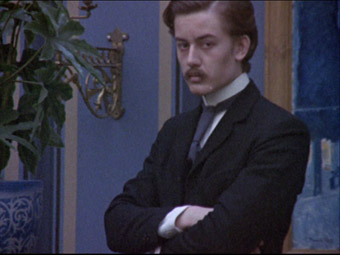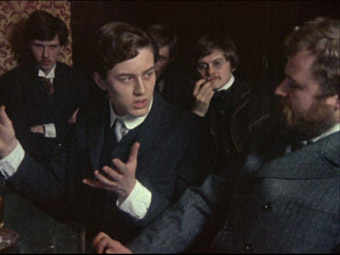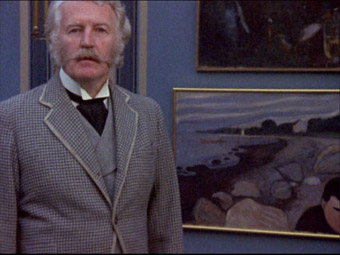|
Norwegian
painter Edvard Munch is one of those artists that few people who have not taken a specific interest in art history tend to have heard of,
but whose work just about everyone knows, or at least one
specific piece of it. We're talking about The Scream,
of course, also referred to as The Shriek, an iconic
work in which the anxiety of a screaming woman spills out
into the distorted landscape that surrounds her. It's a
painting that's found its way into the public consciousness
through its absorption into popular culture and continues
to do so – the face became the instantly recognisable Halloween
mask in Wes Craven's 1996 Scream, while
the painting and even its central character have both been
featured in Simpsons episodes.
The
fame of that image alone might suggest that its creator
was a successful and wealthy man, but in the manner of artists
breaking new ground in years past, nothing could be further
from the truth. Munch painted and Munch exhibited and the
public and critics hated what they saw, and I'm not talking
once but every time he tried, over a period of many years
and canvasses. When most would have given up, Munch just
kept on developing his art in his own non-conformist style,
and yet every time he showed his work it was slated, often
with extreme hostility. In Berlin, an exhibition of his work
was forcibly closed just days after it opened, so outraged
were the establishment by the "anarchistic smears"
that were contained within. So what was the horrible crime against
art that Munch's paintings were committing, that so offended
the eye of so many beholders? Well, it was quite simple
really – it was new. Munch had chosen to reject established
naturalism in favour of a style that reflected not just
what he saw, but how he reacted to it emotionally, psychologically.
This approach was later to attract a number of practitioners
and eventually find itself a name: Expressionism.

My
own relationship with Munch's work goes back a fair few
years, and The Scream wasn't the first Munch painting
I saw. Arriving at his work through art history classes,
my introduction to the artist was his 1894 painting The
Vampire and the 1899 The Dance of Life, both
of which I adored. He was the first artist – and Expressionism
the first art movement – that I bought books about. The works
of Munch and the later Expressionist artists made immediate
sense to me, both as art and a subjective reading of reality.
I was also soon to realise that this approach translated
beautifully to film, something 1920s German cinema in particular
was quick to understand and employ.
I've
known for years about Peter Watkins' biographical film on
Munch but have never managed to track it down, despite the
considerable praise it has attracted over the years. A cynical
part of me couldn't help wondering if that praise was so
enthusiastic precisely because the film was so hard to see,
that strain of critical snobbery that likes to suggest it
knows something that you never will. Then again, I've yet
to see a Peter Watkins film that hasn't left me reeling – Culloden, The War Game
and Punishment
Park are all high up on my list of films everyone
should see before they die, and the prospect of one of my
favourite painters cinematically profiled by one of my favourite
filmmakers was an enticing one.
Those
familiar with Watkins' cinematic style will immediately
find themselves at home here. This is a drama documentary
with the emphasis on the latter – were it not for the period
in which the extensive re-enactments were set, you could
almost swear Watkins had been there with his camera to record
events as they occurred. Family life and social activities
are patiently observed, with characters intermittently acknowledging
the presence of a camera that will hurriedly reframe or
struggle to focus, while many of them are interviewed by
an unseen but intermittently audible reporter. This sense
of reality is enhanced by performances that are so natural
that it's almost detrimental to classify them as performances
at all, an affect achieved by casting non-professionals
and allowing them to express their own views in their own
way (their resulting modern accents and expressions that were
apparently a target for criticism on the film's initial
Norwegian release, which I think is a little picky and somewhat
missing the point).

The
narrative is constructed around readings from Munch's
diary, written sometimes in the third person, and a sober
BBC-style voice-over that provides us with detailed information
on the lives of Munch, his family and his associates, particularly
the café revolutionaries who made up the Boheme,
a well-intentioned but largely ineffective group whose contempt
for established attitudes and religion I nonetheless found
endearing. Relationships embarked on by Munch and
his compatriots receive particular attention, especially
Munch's involvement and post-breakup obsession with the
woman he records in his diary as Mrs. Heiberg, the sort
of self-destructive hopeless cause that always makes me
want to slap some sense into the unfortunate victim. For
Munch it proved fateful, tarring his personal life
with the same level of disappointment and anguish that public
and critical reaction did to his career. If you're looking
for a definition of both tortured artist and driven visionary,
then Edvard Munch is your man.
If
this was the extent of Watkins' reworking of biopic conventions
then it's doubtful the film would have attracted the acclaim
it has, but these are the foundations on which he builds
a far more complex and layered work. Right from the start,
he establishes a socio-political element, counterpointing
the superficiality of the middle-class promenade with an
interview with a working-class family, while the narration highlights
the grim conditions and prospects for those at the bottom
of the social ladder. Dates are contextualised through significant
events of that year, a painting by Van Gough or a novel
by H.G. Wells always balanced with news of militaristic
foreboding, such as the birth of Hitler or the invention
of the gatling gun, a direct juxtaposition of the creative
and the destructive.
Just
as Munch rejected naturalism for expressionism, Watkins deliberately
disrupts drama-documentary conventions with a broken mirror
approach to editing, cross-cutting between locations, characters
and timeframes to occasionally disorientating but often hypnotic
and always purposeful effect. Scenes set in the narrative
present are peppered with images of childhood sickness and
Munch's failed relationship with Mrs. Heiberg, twin traumas
that were to haunt the artist's early years and work, while
the underlying linear passage through the most crucial years
of his artistic development can switch in an instant from
the observational to a detailed analysis of how a particular
painting was constructed. The soundtrack is at times similarly
complex, particularly during the cross-cut sequences, two
of which are dominated by the sound of Munch weeping, a
subjective veil of despair that encompasses everyone and
everything even indirectly connected to him.

It's
fascinating, information-packed viewing and it needs to
be – at three-and-a-half hours in length, with only the
voice-over delivered in English and a fair amount of (carefully
selected) image repetition, the film is almost a gift for
rejection by the more intolerant viewer. But if you're serious
about cinema and about art, then Edvard Munch
is an outstanding must-see, a film that really does redefine
the terms by which subsequent and future biographical documentaries
should be judged.
Framed
in its original 1.33:1 ratio – the film was originally created
for TV screening – it's easy to spot the 16mm origins, particularly
in the ever-present film grain, though this varies enough
to make me wonder if different film stocks weren't used
for different sequences. Contrast, colour and black levels
also vary – for the most part they are very good but in
places are a little washed out, but again this could be
a deliberate artistic choice. Within the restrictions created
by the original material, this is a generally very decent
transfer.
The
Dolby 2.0 mono soundtrack has a trace of background hiss,
but you'll rarely hear it. For the most part this is a clear,
clean track that showcases Watkins' expressive sound montages
well enough.
There
are none on the disc, and given the length of the film and
Watkins' own refusal to be interviewed by a third party,
that's hardly surprising. This matters not, thanks to the
excellent Booklet that accompanies
the DVD, which contains a wonderfully detailed essay on
the film by Joseph A. Gomez, a typically revealing self-interview
by Watkins, notes on the restoration by Oliver Groom and
a useful timeline of Munch's life. I'd go as far as to suggest
that the information packed into this booklet actually surpasses
what most commentary tracks could deliver.
I've
waited a long time to see this film, long enough to build
up some unreasonably high expectations, but Edvard
Munch lived up to them and delivered a fistful
of surprises on the way. As someone who thought he knew
about this particular artist I found that I still had much
to learn, about Munch himself and particularly about the
social and political situation in Norway of the period.
Not an easy entertainment by any means, it's still a hell
of a film, and further proof, if needed, that Peter Watkins
is one of this country's most important and innovative filmmakers,
and yet still one of it's most criminally undervalued.
|